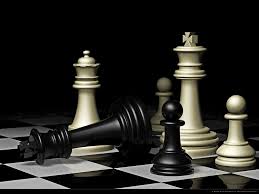We were chatting with an older British man yesterday about activities available on this island. He said that he enjoyed chess and ping pong.
"Chess," the spousal unit said. "I'd enjoy a chess game."
"I
only play online," he replied. "In fact," he continued, "I'm in the middle of three games right now. I'm playing people in Spain, the Ukraine, and Maine." (
He did resemble Henry Higgins.) "I find face-to-face chess too slow."
Face-to-face might be slow, but computer chess is even slower. You make your moves over several days or weeks, but you don't have to twiddle your thumbs waiting for your opponent to move. You are playing outside of actual time.

In real time, face-to-face chess may be slow, but it has the wonderful advantage of providing human company, developing a friendship, frustrating or exhausting your opponent and yourself, and forcing you to think on the spot. Should you conquer your opponents, they can shake your real hand. You can sometimes even take back a move if the other player is feeling generous. My family had various strategies to deal with slow players.
My grandfather would call his moves from his bed where he would nap during a slow game. Uncle George (A"H) memorized all the soliloquies of Hamlet one summer while waiting for his opponent to move.
Internet chess has the advantage of not leaving you stuck in front of a chess board. You are sent a message when your opponent makes a move. You can pick up your message and rejoin the game, anywhere, anytime.

Long distance chess has always been popular. Before the internet, chess was played by postcard, one move at a time. After my father died, I found 100s of chess postcards among his papers -- 3" X 5" cards with three-cent stamps printed on them. He must have bought and used these between 1947 when he moved to Canada and 1954 when the rate went up to four cents. These games kept him in touch with a close friend or relative - maybe a fellow patient at the veteran's hospital where he stayed during and after World War II.
My father never spoke of his long distance chess matches and they produced no stories. Meanwhile, the face-to-face chess that my family played produced many stories: stories of anger, embarrassment, sabotage, and deceit. My story on four generations of chess can be found
here.
Which would you rather play - internet chess or face-to-face?
from forwardslash @ hubski.com
ReplyDeleteI taught myself chess using a computer game which is probably why I'd prefer to play chess on the internet. Though I would probably play using a site that allowed for a lot quicker matches. If I were to play chess it would probably be because I was trying to train, which is something I've wanted to do. I think I've also had bad experiences with playing chess in person. Though my parents bought me a set when I was young, they would only play a few rounds with me occasionally and when I would play at school the only people who would play were poor sports. We even had a guy who went to play in the Canadian nationals in our elementary school but he was not the kind of person I would want as a friend or opponent.